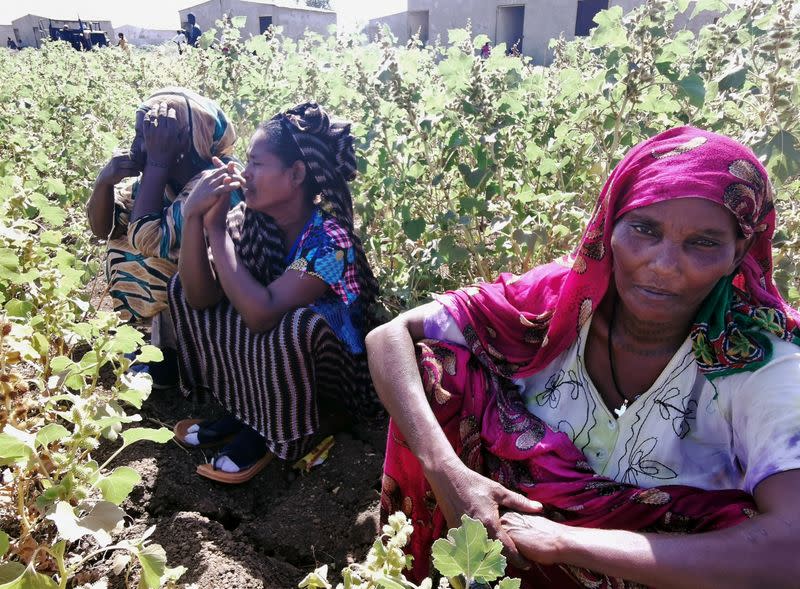
Latest News Regarding
Horn of Africa
More on Eritrean Troops in Ethiopia’s Tigray Region
More on Eritrean Troops in Ethiopia’s Tigray Region
Source: The New York Times published on 28 December 2020 an article titled “Refugees Come under Fire as Old Foes Fight in Concert in Ethiopia” by Declan Walsh and Simon Marks.
The article reports that Eritrean soldiers are fighting in Tigray Region in coordination with Ethiopian forces; the Eritrean focus seems to be Eritrean refugee camps inside Ethiopia where there once were nearly 100,000 Eritrean refugees. 0 commentsLabels: Abiy Ahmed, conflict, Eritrea, Ethiopia, human rights, Isaias Afewerki, refugees, Tigray Region, TPLF
As U.S. forces leave, Somalia’s elite fighting unit fears becoming a political pawn
As U.S. forces leave, Somalia’s elite fighting unit fears becoming a political pawn




Source: Washingtonpost, By Max BearakWednesday December 30, 2020
U.S. Army Brig. Gen. Damian T. Donahoe speaks with service members during a visit in September in Somalia. (Senior Airman Kristin Savage/Combined Joint Task Force — Horn of Africa/Associated Press)
NAIROBI — The United States has invested billions of dollars in Somalia over the past decade, in part to build and train Danab, the only effective, apolitical fighting unit in the country’s war against al-Qaeda-affiliated al-Shabab.
Now, with hundreds of the U.S. troops who trained them leaving Somalia under orders from the Trump administration, current and former Danab officers are fearful that diminished American supervision will leave the elite division vulnerable to political interference from Somalia’s government, which is embroiled in a bitterly disputed election scheduled for February.
In the past, “if the government ever tried to interfere with Danab for political nonsense, the Americans were the ones who said: ‘Hey, stop it,’ ” said Ahmed Abdullahi Sheikh, Danab’s top commander from 2016 to 2019. “That was the condition the Americans attached when they started training us, that we’d be apolitical. Without that, our defense mechanism toward our own government doesn’t exist.Sheikh and other officials stressed that although large-scale political interference with the 1,150-member force isn’t happening yet, the conditions are ripe.
A Danab officer based in the central Somali city of Galkayo said he has worried about his comrades’ reputation as being apolitical every day since the announcement that the Americans were leaving.
“My biggest fear is losing that reputation, that momentum. The trust that people have in us, that we are fighting for our country and not some politician, is our biggest strength. Losing it would be nothing short of disaster,” he said, speaking on the condition of anonymity for fear of reprisal. “I don’t trust our politicians, just like most people in Somalia don’t.”
Somalia’s defense minister, Hassan Hussein Haji, did not respond to repeated requests for comment. Lt. Cmdr. Christina Gibson, a spokeswoman for U.S. Africa Command, said the U.S. military “will not be ending our important relationship with [Danab],” but that “specific training plans are still being developed and refined.”
Somalia’s population, while ethnically homogeneous, is split among clans that compete, often violently, for political power. With elections approaching, feuds have grown and President Mohamed Abdullahi Mohamed “Farmaajo” has been accused of replacing officials ranging from his prime minister to election administrators to bolster his shot at reelection. A second Danab officer who spoke on the condition of anonymity said he feared that his superiors could be next.
In the year since Sheikh was removed as Danab’s leader, three others have cycled through, though he said that was due to a combination of politics and operational factors.
Danab has been more successful than other Somali military units in fighting al-Shabab because of far superior training and equipment, but it is greatly outnumbered by al-Shabab, which experts believe has as many as 10,000 active fighters, and a much wider network of informants and supporters.Somalia continues to weather thousands of al-Shabab attacks big and small every year. While the U.S. military ramped up a drone campaign in recent years — which it says will continue despite troops being “repositioned” to neighboring Kenya and Djibouti and allegations that the campaign has killed dozens of civilians — al-Shabab still controls the majority of Somalia’s rural interior and runs an extensive tax racket that keeps it well-funded.
“The timing of the U.S. withdrawal for Danab is just terrible,” said Hussein Sheikh-Ali, a former security adviser to Somalia’s president and chairman of the Hiraal Institute, a think tank. “Both the U.S. and Somalia are going through similar transition periods with contested elections and accusations of illegitimacy at the highest level. At the minimum, this move creates chaos — and we were already in anarchy.”
A Defense Department inspector general report released in November found that al-Shabab has remained intact and capable in the face of U.S. operations, and that the Somali military — with the exception of Danab — was failing to actively counter its operations.
“Despite many years of sustained Somali, U.S., and international counterterrorism pressure, the terrorist threat in East Africa is not degraded: al-Shabaab retains freedom of movement in many parts of southern Somalia and has demonstrated an ability and intent to attack outside of the country, including targeting U.S. interests,” the report found.

Somali police officers tow their car from the scene of a roadside explosion in the Hodan district of Mogadishu in July. (Feisal Omar/Reuters)
On Dec. 18, al-Shabab asserted responsibility for an attack in Galkayo that killed three high-ranking military officers, including Maj. Mukhtar Abdi Aden, the regional Danab commander. The attack took place at a stadium where the current prime minister, a recent appointee of the president’s, was to appear for a campaign rally. The commander’s presence there raised the question for some of whether Danab was already being used as a political tool.
“Their presence at events is how the government projects power — it intimidates anybody else, and the people believe that Danab is on the government’s side,” said Sheikh-Ali. “Under American eyes, you’d only see them engaging in counterterror operations.”
The directive from the Trump administration set a target of troop withdrawal from Somalia by the time Trump leaves office on Jan. 20. The U.S. military has dubbed its repositioning Operation Octave Quartz and deployed numerous combat ships, including an aircraft carrier, to aid the mission.
The U.S. military’s top official at Africa Command pushed back against the notion that troop repositioning put Somali forces on their back foot.
“To be clear, the U.S. is not withdrawing or disengaging from East Africa. We remain committed to helping our African partners build a more secure future,” Gen. Stephen Townsend said in a statement. “We also remain capable of striking Al-Shabaab at the time and place of our choosing — they should not test us.”A plan created in 2017 by the United States and other countries with a military presence in Somalia aimed for Somali security forces to be capable of operating without outside help by next year, a goal that many had recognized as unachievable even before the decision to effectively end all in-country training by the Americans.
More than 19,000 African Union peacekeepers from a smattering of countries around the continent remain in Somalia, and Turkey is training around 10,000 regular soldiers as well as small contingents of special forces. The European Union and Qatar also provide millions of dollars in aid.
The incoming Biden administration in Washington has not made any public comment on whether it will redeploy U.S. forces from Kenya and Djibouti back to Somalia, though regional security experts said it wouldn’t be particularly difficult, given the infrastructure the U.S. military has built over its years there.
President-elect Joe Biden, however, did make campaign promises to end America’s “forever wars,” of which Somalia, while less cited than Iraq or Afghanistan, has been an enduring example. The withdrawal, while only to neighboring countries, would be in line with that inclination, though Sheikh-Ali and other experts lamented the awkward timing.
“How embarrassing for the U.S. government to invest so much in Somalia,” he said, “and then to have some politician here use it for their own purposes.”
The UK announces £5 million for thousands of Somalis facing starvation
The UK announces £5 million for thousands of Somalis facing starvation




Source: Hiiraan Online, Wednesday December 30, 2020
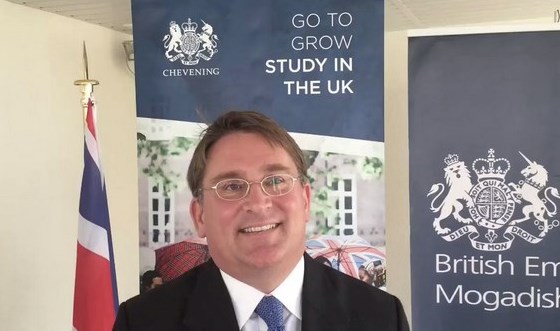
MOGADISHU (HOL) – The UK has announced £5 million to support the provision of life-saving saving support and food assistance to over 100,000 people facing starvation in Somalia. The funds will be channelled through the World Food Programme (WFP).
The Foreign, Commonwealth & Development Office said Wednesday it was releasing the funds which are part of £47 million of aid to immediately provide food, nutrition, water and shelter for vulnerable families in nine countries and regions.
The funds will reach 139,000 people in Somalia who are facing acute food insecurity especially in light of the impact of COIVD-19, weather effects and locusts invasions. Thousands of acres of farmlands have in the last one and half years been destroyed by desert locusts in Somalia.
UK Foreign Secretary Dominic Raab said the coronavirus pandemic, starvation and conflicts have left millions of people across the globe struggling to survive adding that the new funding will go along way in alleviating suffering.
“This extra emergency UK aid will mean people can feed their families and prevent these crises from escalating into widespread famine. We hope to see other donors step up to the plate with some extra funding to prevent these global crises getting worse,” said Raab.
The extra UK aid announced today will help continue momentum and pressure other donors to step up with additional financing, the Foreign Office said urging the UN to mobilise more funding to attend to those suffering in various countries.
All Sides Implicated in Human Rights Crimes in Ethiopia’s Tigray Region
All Sides Implicated in Human Rights Crimes in Ethiopia’s Tigray Region
Source: Human Rights Watch posted on 23 December 2020 an interview with Laetitia Bader titled “Uncovering Crimes Committed in Ethiopia’s Tigray Region.”
Bader met with some of the 50,000 plus Ethiopian refugees in eastern Sudan and reported allegations of human rights crimes perpetrated by all sides to the conflict in Tigray Region. 0 commentsLabels: Amhara Region, ENDF, Eritrea, Ethiopia, Fano militia, human rights, refugees, Sudan, Tigray Region, TPLF
Sudan taking control of land on border with Ethiopia – minister
Sudan taking control of land on border with Ethiopia – minister



Source: Routers, Sunday December 27, 2020
Ethiopian women, who fled the ongoing fighting in Tigray region, are seen at the al-Fashqa refugee camp in the Sudan-Ethiopia border town of al-Fashqa, in eastern Kassala state, Sudan November 13, 2020. REUTERS/El Tayeb Siddig
KHARTOUM (Reuters) – Sudan has taken control of most of the land it accuses Ethiopians of encroaching upon near the border between the two countries, the Sudanese information minister said on Saturday.
Tensions in the border region have flared since the outbreak of conflict in Ethiopia’s northern Tigray region in early November and the arrival of more than 50,000 mainly Tigrayan refugees in eastern Sudan.Disputes have been concentrated on agricultural land in al-Fashqa, which falls within Sudan’s international boundaries but has long been settled by Ethiopian farmers.
There have been armed clashes between Sudanese and Ethiopian forces in recent weeks, with both sides accusing the other of instigating the violence. The two countries held talks this week in Khartoum over the issue.
“We believe in dialogue to solve any problem,” Sudan’s information minister, Faisal Salih, told Reuters. “But our army will do its duty to take back all our land. Currently our army has taken back between 60% and 70% of Sudanese land.”
Sudanese forces had acted defensively, and clashes had subsided in the past two days, Salih said.
“Sudanese intelligence reports confirmed that the organisation, training and arming of the forces that attacked were not militias but regular forces,” he added.
Ahead of the talks this week, Ethiopia’s foreign minister, Ato Demeke Mekonnen said the Sudanese military had carried out attacks beginning on Nov. 9.
“Agricultural products of Ethiopian farmers are looted, their camps are vandalized, and they are also hampered from harvesting their own farms. A number of civilians have been murdered and wounded,” he said.
Ethiopian Prime Minister Abiy Ahmed blamed “parties with hidden motives to create hostility and suspicion between peoples” for the violence, in a statement issued on Thursday.
Sudanese officials say the border was demarcated in the first years of the 20th century, and that negotiations are limited to talks over placing additional markers on the land at 2km rather than 10km intervals.
Reporting by Ali Mirghani, Nafisa Eltahir and Nadine Awadalla; writing by Nafisa Eltahir and Aidan Lewis; Editing by Leslie Adler
Has the UN Failed Somalia?
Has the UN Failed Somalia?
Source: Aljazeera interviewed on 28 November 2020 the head of the UN Office for Somalia, James Swan, in a 25 minute podcast titled “James Swan: Has the UN Failed Somalia?“
James Swan provides an upbeat account of progress made in Somalia and its outlook for 2021 while acknowledging that more needs to be done. The Aljazeera interviewer is much more skeptical. 0 commentsLabels: al-Shabaab, AMISOM, elections, human rights, refugees, Somalia, terrorism, UN, UNICEF, UNSOM, US
Residents of Kenya-Somalia Border Area Fear Conflict Amid Diplomatic Tensions
Residents of Kenya-Somalia Border Area Fear Conflict Amid Diplomatic Tensions




Source: VOA, By Mohammed Yusuf
Friday December 25, 2020
Kenya and Somalia have agreed to try to reduce diplomatic tensions at a conference this week in Djibouti. A firefighter sprays the area in front of the People’s Palace, a public ceremony hall, in Djibouti, on May 14, 2020.
NAIROBI – There is growing concern the tensions between Kenya and Somalia may erupt into fighting, due to a military buildup along the two countries’ borders.
The Somali federal government has sent troops to the border town of Beled-Hawo, while forces from Somalia’s Jubaland region, which enjoys a good relationship with Kenya, are stationed in the nearby Kenyan town of Madera.
Mohamed Maaalim Mahamud is the Mandera County senator. He said his people should not bear the brunt of the bad diplomatic relations between the two countries.“We don’t want a situation where these two forces fight and our people’s lives are in danger,” Mohamud said. “We have now Kenya and Somalia relations apparently is not good for the last two days but this should not be borne to Mandera people.”
Hundreds of fighters allied to Jubaland Interior Minister Abdirashid Janan have been stationed in Madera for months. Last March, these forces launched a cross-border attack in Beled Hawo, killing dozens.
On Tuesday, Madera residents took to the streets to demand the Jubaland forces to leave and stop endangering their lives.
The protest took place after the Somali government sent hundreds of soldiers to secure the Beled-Hawo area.
Fifty-year-old Jamaa Warsame is one of the elders in Beled-Hawo.
He said the residents of the town cannot afford to flee their homes this time of the year.
Warsame said that during this time it’s really hot, dry and there is drought. He says, we are so much against any conflict this time. He said we would like to urge our government that is in control of the area to find a solution and reach an agreement with those who are opposing it so that we can enjoy the peace we have now.
Last week, Somalia cut diplomatic ties with Kenya. The federal government accuses Kenya of interfering with its internal affairs — an accusation that Kenyan official deny.
George Musamali is the head of the Center for Risk Management in Africa. He says any conflict between Kenya and Somalia would be felt beyond the border area.
“We have always been having incursions across the border inside Kenya, the place has always been volatile and now we are seeing build up of forces along the border,” Musamali said. “Then this is going to make a major threat for security in the entire area and it’s going to affect not only Kenya, it’s going to affect the Great Lakes region in general. I believe we need to have a diplomatic solution to this row as opposed to bringing forces along the border clearly indicating that there is hostility.”
For its part, the Jubaland government has insisted on the withdrawal of government forces in the neighboring Gedo region, a demand that the government in Mogadishu has refused to accept.
Ethiopia to hold elections in June 2021
Ethiopia to hold elections in June 2021



Source: DW, Friday December 25, 2020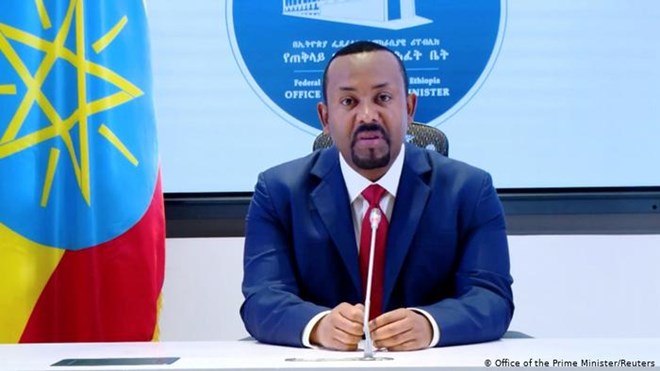
Ethiopia will hold its parliamentary election on June 5 next year, the National Electoral Board said Friday, after polls scheduled for August 2020 were postponed due to the coronavirus pandemic.
Prime Minister Abiy Ahmed’s Prosperity Party, a pan-Ethiopian movement he established a year ago, faces opposition from increasingly strident ethnically-based parties seeking more sovereignty for the regions they represent.
Africa’s second most populous nation with some 110 million citizens, Ethiopia has a federal system and 10 regional governments, many of whom have border disputes or are experiencing unrest.
Tigray tensions
Indeed, the delayed ballot was a factor that provoked tensions between Abiy and the dissident area of Tigray, which ultimately saw the prime minister dispatch troops to the region last month in a military offensive that left thousands dead and led to tens of thousands of others seeking refuge.
Tigray held its own elections in September in defiance of the federal government, which stated the vote was illegal.
Abiy, who came to power in 2018 and won last year’s Nobel Peace prize, had promised free, fair and democratic elections for the ballot that should have taken place on August 29.
The tenure of both the parliament and Abiy was due to expire in October but was extended because of the pandemic.
After Kenya, Somaliland’s Bihi shuttles to Djibuti

After Kenya, Somaliland’s Bihi shuttles to Djibouti



Source: Hiiraan Online, Wednesday December 23, 2020
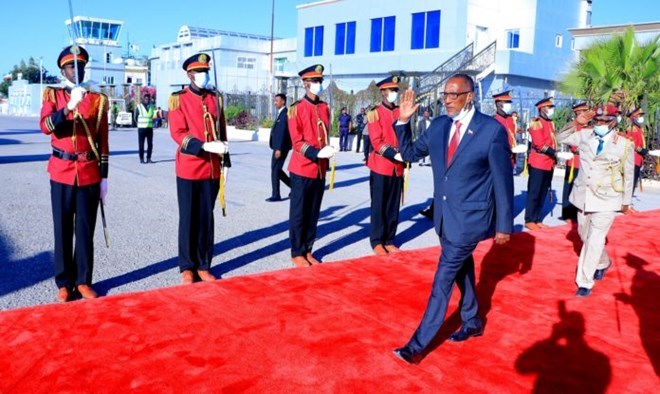
DJIBOUTI (HOL) – Barely a week after concluding a two days visit to Kenya, Somaliland President Muse Bihi Wednesday jetted off to neighbouring Djibouti.
Bihi arrived in Djibouti Wednesday alongside a delegation of ministers as the breakaway region ratchets up its quest for international recognition.
The Somaliland Presidency said on Twitter Bihi travelled to Djibouti on invitation from President Omar Guelleh.
The Somaliland leader was last week in Nairobi for two days where he struck a deal with President Uhuru Kenyatta for both sides to elevate their diplomatic statuses.
Both sides, a communique from the meeting noted would open consulates in their respective territories by March.
The move angered Mogadishu which announced a cut of diplomatic relations with Kenya adding to earlier measures which included expulsion of ambassador Lucas Tumbo late November.
The substance of the Djibouti meeting remains unclear but would be closely watched from Mogadishu which remains a strong ally of Djibouti.
Gränserna mot Danmark och Storbritannien stängs
Gränserna mot Danmark och Storbritannien stängs
Source: Sydsvenskan, 21 December 2020, Sverige stoppar resor från Danmark och Storbritannien efter att en ny variant av coronaviruset spridits i länderna. Inreseförbudet gäller en månad framåt, meddelar regeringen.TT

Inrikesminister Mikael Damberg (S) meddelar att Sverige stoppar resor från flera länder. Arkivbild.Bild: Anders Wiklund/TT– Vi gör det här för att skydda den personal som kommer tvingas att tillbringa jul och nyår på sjukhus och akutmottagningar runt om i Sverige, säger inrikesminister Mikael Damberg (S) på en pressträff på måndagen.https://39b3fffe6884ec21c96ab65dc16f488e.safeframe.googlesyndication.com/safeframe/1-0-37/html/container.htmlBeskedet gäller dock inte svenska medborgare, som inte kan hindras från att resa hem.– I inreseförbudet från Danmark undantas förutom svenska medborgare, även andra personer som bor eller arbetar i Sverige samt personer som utför godstransporter, säger Mikael Damberg.Från och med måndagen avråder utrikesdepartementet också från icke nödvändiga resor till Storbritannien.– Flera stora flyg- och transportbolag har ställt in eller kraftigt minskat sina avgångar till och från Storbritannien. Det kommer försvåra för svenskar och personer hemmavarande i Sverige att återvända hit, och riskerar att orsaka dem betydande problem, säger utrikesminister Ann Linde (S).Den som rest till Sverige från Storbritannien sedan den 12 december uppmanas testa sig för covid-19 så snart som möjligt.– Den som kommer från Storbritannien uppmanas vidare att stanna hemma och undvika kontakt med andra så långt det är möjligt i upp till en vecka, alltså sju dagar efter ankomst. Testningen bör upprepas vid dag fem efter ankomst, säger Folkhälsomyndighetens generaldirektör Johan Carlson.Arbetsgivare uppmanas av myndigheten att säkerställa att personal som rest från Storbritannien testas.Redan på söndagen aviserade regeringen om att gränsen till Storbritannien skulle stängas, men sedan dess har flera partiledare krävt ett inreseförbud även från Danmark eftersom flera fall av den nya mutationen har upptäckts även där.Enligt Folkhälsomyndigheten tyder ingenting på att den nya varianten av coronaviruset ger en svårare sjukdom. Utöver Storbritannien och Danmark har enstaka smittade även rapporterats från Nederländerna, Belgien, Australien och Sydafrika.Folkhälsomyndigheten ska utöka kontrollen av prover för covid-19, för att undersöka om den nya mutationen redan finns i landet.– Det är inte uteslutet att det redan finns i Sverige, men vi har ännu inte kunnat bekräfta det, säger Johan Carlson.Den före detta statsepidemiologen Annika Linde säger till TT att ett inreseförbud kan vara viktigt.– Jag trodde inte att man skulle införa ett inreseförbud. Det är det absolut bästa man kan göra: att man ser till att ingen med det här viruset kommer hem alls, säger Annika Linde.I rapporterna från Storbritannien är den nya virusvarianten betydlig mer smittsam än tidigare varianter. Det har en uppskattad potential att öka reproduktionstalet, det så kallade R-talet med 0,4 med en uppskattad överförbarhet på upp till 70 procent, enligt Europeiska centrumet för förebyggande och kontroll av sjukdomar.https://39b3fffe6884ec21c96ab65dc16f488e.safeframe.googlesyndication.com/safeframe/1-0-37/html/container.html– En ökning med 0,4 låter kanske inte så mycket men det kan betyda att smittspridningen ökar och för vården som redan nu arbetar på marginalen kan det bli en katastrof, säger Annika Linde.
Sudan, Ethiopia to hold border demarcation talks week after clash
Sudan, Ethiopia to hold border demarcation talks week after clash



Source: Aljazeera, Monday December 21, 2020
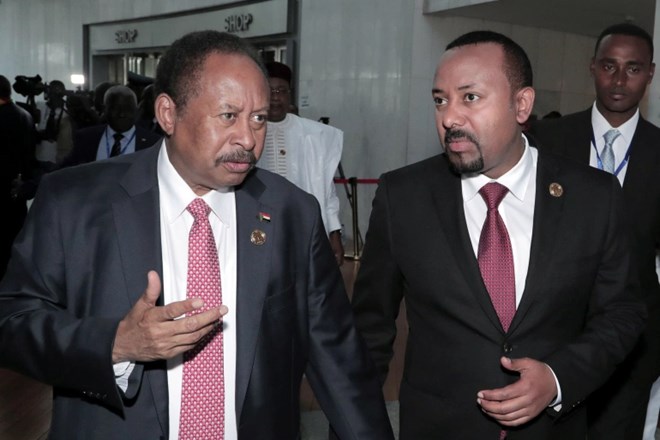
Sudan and Ethiopia will hold negotiations next week to delineate their shared border, a statement from Sudanese Prime Minister Abdalla Hamdok’s office said on Sunday.
The talks will be held on Tuesday, a week after Ethiopian forces reportedly ambushed and killed Sudanese troops along the border.
“Hamdok and his Ethiopian counterpart Abiy Ahmed on Sunday discussed the meeting of the committee for delineating the borders which will be held on December 22,” the statement said.
The two leaders met on the margins of a summit under way on Sunday in Djibouti of the Intergovernmental Authority on Development (IGAD), an East African regional bloc comprising eight countries. Hamdok is the current head of the IGAD.
A cross-border attack by Ethiopian forces and rebels last Tuesday killed at least four Sudanese troops and wounded a dozen others in the Abu Tyour area in eastern Sudan’s Gadarif province.
Sudan’s state-run news agency SUNA on Saturday said its military had deployed “large reinforcements” into the province to reclaim territories controlled by Ethiopian farmers and rebels in Sudan’s al-Fashqa border area.
The troops would stop at the borderline according to the 1902 deals between Sudan and Ethiopia, SUNA reported.
Tuesday’s cross-border attack in Abu Tyour came amid weeks-long fighting in Ethiopia’s northern Tigray region that has pitted the federal government against regional authorities.
The Tigray fighting has sent more than 52,000 Ethiopian refugees into Sudan, most of them into Gadarif province.
At the start of the clashes in Tigray, Sudan deployed more than 6,000 soldiers to its border with Ethiopia.
Ongoing border clashes
The attack in Gadarif was the latest by Ethiopian forces and rebels on Sudanese troops and people over the past several months, and has strained ties between the two neighbours.
The sides have held talks in recent months to encourage Ethiopian farmers to withdraw from Sudan’s al-Fashqa border area, which they have cultivated for years.
Following the attack, the head of Sudan’s ruling sovereign council, General Abdel-Fattah Burhan, travelled to Gadarif and spent three days there overseeing the deployment of heavily armed troops to the border area, according to a senior military official.
The official spoke on condition of anonymity because he was not authorised to brief the media.
Addis Ababa was keen to downplay the importance of the incident, saying it did not threaten the relationship between the two countries.
“Such incidents will not break the bond between our two countries as we always use dialogue to resolve issues. Those fanning discord clearly do not understand the strength of our historical ties,” Prime Minister Abiy tweeted on Thursday.
IGAD Communique silent on Somalia-Kenya row
IGAD Communique silent on Somalia-Kenya row




Source: Hiiraan Online, Monday December 21, 2020
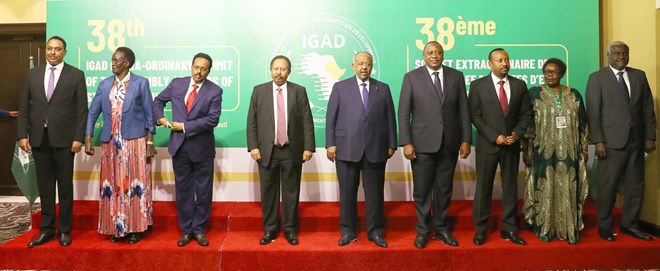
DJIBOUTI (HOL) – The regional body IGAD refrained from mention of the Somalia-Kenya diplomatic tensions in its final communique Monday amid expectations the issue would feature prominently in the talks.
A communique released Monday only referred to Elections and Security in Somalia but stayed clear of the impasse pitying the two nations.
statement which came a day after the meeting signifying lengthy negotiations on the final draft also affirmed the Ethiopian Government’s intervention in Tigray region.
Somalia said last week it had submitted a letter to the IGAD chairman Abdalla Hamdok who chairs the eight member regional bloc.
The letter which added to a series of actions Somalia has taken against Kenya was premised by Villa Somalia on the understanding that IGAD would intervene on the matter.
But the regional bloc which draws membership from economic powerhouses like Kenya and Ethiopia both of which were hesitant on regional intervention on their respective states has for a long time taken decisions aligned to member state influence.
However, a meeting between Presidents Kenyatta and Farmaajo earlier in the day may have informed the decision not to factor in the diplomatic tussle in the final communique.
Sources said the two countries have been under international influence to resolve their disputes at bilateral level as they have in the past.
Kenya, Somalia tension rises as Farmaajo threatens to kick out KDF

Kenya, Somalia tension rises as Farmaajo threatens to kick out KDF




Source: Nation Africa, Sunday December 20, 2020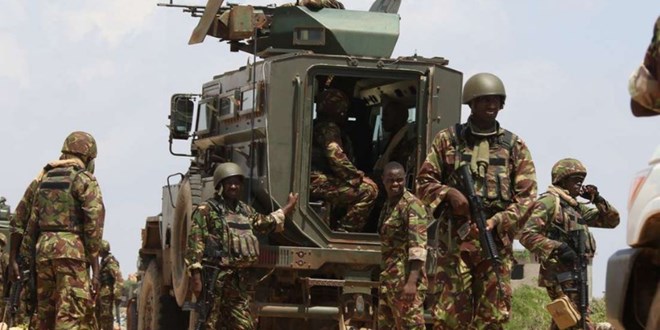
The relationship between Kenya and Somalia continues to deteriorate, with President Mohamed Abdullahi Farmaajo threatening to expel Kenya Defence Forces (KDF) troops stationed in his country.
Regional leaders are expected to hold a meeting in Djibouti today (Sunday) that could feature Farmaajo and his Kenyan counterpart Uhuru Kenyatta.
The threat on KDF comes days after Somalia expelled Kenyan diplomats in a memo sent to Nairobi at1am. On Friday, Defence CS Monica Juma cancelled a press conference at Kenya Army Headquarters at the eleventh hour.
“Everything was set but she did not turn up,” a senior military official told the Nation.
Farmaajo wants Eritrean soldiers to replace KDF in the African Union Mission to Somalia (Amisom).
“Our presence in Somalia is governed by Amisom agreements,” Col Zipporah Kioko, the KDF Spokesperson, said.
Under the agreement that governs Amisom’s Troop Contributing Countries (TCCs), the host government cannot withdraw consent from such a country.
Anti-Kenya campaign
Somalia has dispatched officials to Amisom TTCs and other influential states in an anti-Kenya campaign.
The 38th Extraordinary Summit of the Intergovernmental Authority on Development (Igad) has been preceded with a dispute over agenda.
Initially called by chairman and Sudanese PM Abdalla Hamdok to discuss the humanitarian crisis in Tigray, the agenda had by Friday been altered to Covid-19 response.
Ethiopia fought discussing Tigray at Igad level, insisting it is an internal matter.
Somalia accused Kenya of interfering in its affairs and forced Kenyan ambassador Lucas Tumbo to leave. It recalled its envoy in Nairobi, Mahmud Ahmed Nur Tarzan.
Later, Mogadishu wrote to Igad seeking to have the issue discussed at the summit. That was before Somalia officially cut diplomatic ties with Nairobi.
The question is if Igad will resolve the matter, given that most of its members have interests in Somalia. Eritrean leader Isaias Afwerki may not even be at the summit.
Afwerki has been helping train Somalia troops. Eritrea is involved in a border dispute with Djibouti.
Until recently, Qatari troops were stationed at the disputed border but were withdrawn when Djibouti sided with Saudi Arabia as Gulf nations imposed a blockade on Doha. Eritrea also backed Riyadh.
Mended fences
Asmara suspended itself from Igad in 2006, protesting the dominance of Ethiopia’s TPLF regime. Eritrea has since mended fences with Addis Ababa.
Horn of Africa analyst and director of Southlink Consultants Abdiwahab Sheikh Abdisamad said Igad members have divergent policies on Somalia.
“Ethiopia and Kenya are not reading from the same script. It will be important if they harmonise their views. This is no time for proxies,” he said.
“Kenya should lie low until after the (Somalia) elections. Whoever wins may be willing to talk.”
During a forum on Kenya-Somalia relations on Thursday, Mr Ahmed Mohamed, senior adviser at the Horn Institute, told the audience that every Igad member has problems affecting other countries.
“There are competing influences of Mogadishu’s neighbours and a desire to have an ally in Villa Somalia. Farmaajo is attempting to control the impact of regional influences,” he said.
“Foreign interference has taken a toll on Somalia. Somalia is at war with herself and neighbours.”
‘Political abuse’
Information minister Osman Dubbe said in severing ties, Somalia was responding to “the political abuse and interference by Kenya on our independence”.
The move came as Nairobi hosted Somaliland President Muse Bihi, with whom Kenya agreed to start direct flights and set up a consulate in Hargeisa by March.
Farmaajo’s reaction baffled many since his administration had endorsed Kenya’s application to set up a diplomatic outpost in Hargeisa.
Shadrack Kuyo, a senior adviser at the Horn Centre, said the Somali President is escalating tensions to win another term.
“He rode to power in 2017 on the back of anti-Ethiopian sentiments,” Kuyo said.
Somalia is unhappy that Jubbaland President Ahmed Madobe has threatened to stop elections in his state unless the national army pulls out of Gedo.
Last week, Mogadishu witnessed protests against the teams set up to officiate elections, with opposition candidates demanding their disbandment.
Amid the chaos, officials in Nairobi worry al-Shabaab could thrive.
New warning
Mr Zadock Syong’oh, a former assistant minister, argued that Somalia’s situation makes it hard to relate with the centre alone.
Abdiwahab said the role of Gulf countries like Qatar has become too crucial to ignore, especially as they fund the government and some candidates.
Western countries like the US and the United Kingdom as well as Turkey, which is the biggest humanitarian aid provider to Somalia, have had influence on the country.
The federal government of Somalia Saturday intensified its diplomatic assault in a statement warning Kenya against supporting a “rebel group” based in Mandera to attack Somali forces based in Beled Hawa.
The statement was referring to Jubbaland forces based on the Kenyan side of the border.
The Nation did not witness any unusual military movements in Mandera.
Farmaajo, Kenyatta meet for the first time since ties cut-off
Farmaajo, Kenyatta meet for the first time since ties cut-off



Source: Sunday December 20, 2020
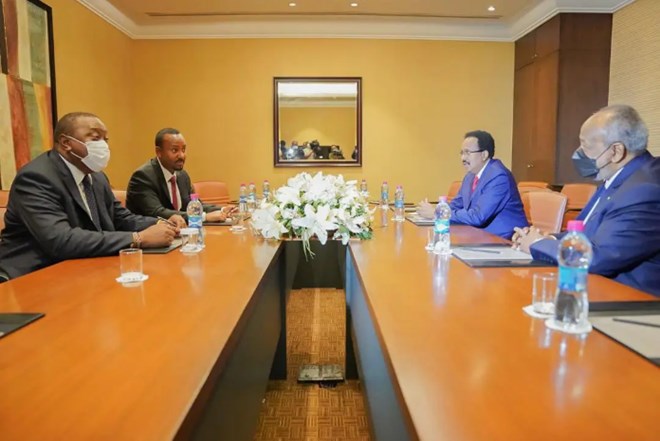
DJIBOUTI (HOL) – Presidents Mohamed Farmaajo and his Kenyan counterpart Uhuru Kenyatta Sunday met in the sidelines of the IGAD regional summit amid an ongoing diplomatic tussle between the two countries.
Pictures from Djibouti showed the two leaders alongside host president Omar Gelleh and Ethiopian Prime Minister Abiy Ahmed in a closed-door meeting.
The meeting between the two leaders is the first since Somalia expelled Kenya’s ambassador Lucas Tumbo late November and subsequently went ahead to cut diplomatic ties with Kenya.Somalia announced last week it had dispatched a letter to IGAD chairman Abdalla Hamdok to discuss the matter.
However, speaking during the opening session of the 38th extraordinary summit, Hamdok did not make reference to the Kenya-Somalia issue but instead referred to the political situation in South Sudan and the conflict in Ethiopia.
A communique of the meeting is expected to be released later in the day when the meeting ends.
Africa and the Human Freedom Index
Africa and the Human Freedom Index
Source: The Cato Institute just released its “Human Freedom Index 2020” by Ian Vasquez and Fred McMahon. It discusses and ranks 162 countries.
The best ranked African country is Cape Verde at number 44 followed by Mauritius at number 51. The bottom 20 is represented by 14 African countries: Zimbabwe (141), Republic of Congo (143), Angola (144), Cameroon (145), Guinea (146), Burundi (148), Ethiopia (149), Mauritania (150), DRC (151), CAR (153), Algeria (154), Libya (156), Egypt (157), and Sudan (161). 0 commentsLabels: Africa, CATO Institute, civil freedom, economic freedom, Human Freedom Index, personal freedom
Kenya planning military attack on us, Somalia warns
Kenya planning military attack on us, Somalia warns




Source: Hiiraan Online, Saturday December 19, 2020
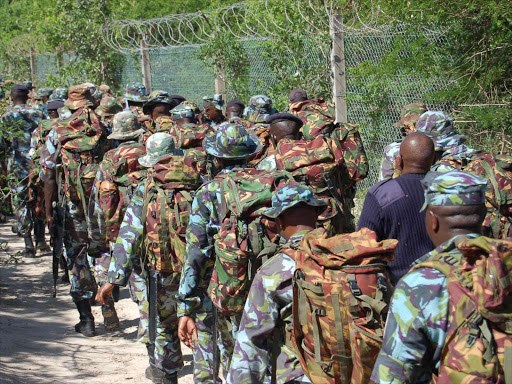
MOGADISHU (HOL) – Somalia has said its neighbour Kenya is mobilisng troops along its border to attack the town of Belet-Hawo inside Somalia in yet another round of accusations by President Mohamed Farmaajo’s administration.
A statement from the Ministry of Information Saturday noted Kenyan forces had been deployed in Mandera town in preparation for an offensive in Belet-Hawo.
Similar reports of Somali troops deployments on its border territory were reported by Kenyan media last week.
“The Federal Government of Somalia has learned that Kenyan forces have deployed weapons and militias in Mandera to raid Belet Haawo and the Somali National Army bases in the area,” the statement read in part.
The statement adds to several accusations Somalia has labelled against Kenya including cut diplomatic ties.
Farmaajo is travelling today to Djibouti for a regional summit to further push his case against Kenya.
Somali federal forces earlier this year crossed into the Kenyan side following a deadly clash with forces allied to Jubbaland administration. Several people were injured and others killed.
Massive ‘Sea Base’ Ship Joins Effort to Withdraw US Troops From Somalia
Massive ‘Sea Base’ Ship Joins Effort to Withdraw US Troops From Somalia




Source: VOA, Saturday December 19, 2020
U.S. Army Brig. Gen. Damian T. Donahoe, deputy commanding general, Combined Joint Task Force-Horn of Africa, center, talks with service members during a battlefield circulation, Sept. 5, 2020, in Somalia.
The U.S. continues to remove troops from Somalia following President Donald Trump’s directive earlier this month.
According to the Pentagon, the Expeditionary Sea Base USS Hershel “Woody” Williams is “conducting maritime operations off the coast of Somalia” to “reposition U.S. DOD personnel from Somalia to other locations in East Africa,” AFRICOM spokesperson Kelly Cahalan told VOA in an email. The operation is dubbed Operation Octave Quartz.The nearly 800-foot-long ship, which is based at Souda Bay, Crete, can support a variety of maritime-based missions, including supporting special operations forces and humanitarian support, according to the Navy.
Trump’s order is part of an effort to draw down U.S. forces globally, including in Afghanistan and Iraq, before he leaves office January 20.
About 700 U.S. troops had been in Somalia, helping local forces in the fight against the al-Shabab insurgency. The mission has gone largely unnoticed in the U.S., but it has been a key component of the Pentagon’s campaign to combat al-Qaida worldwide.
Pentagon ‘committed’
The Pentagon said the relocated troops would continue their mission fighting violent extremist organizations in the region. It would not comment on specifics, including how many troops have been moved or when the relocation will be complete.
“The U.S. remains committed to our work in East Africa and Somalia, to include maintaining regional security, training, as well as continuing to pressure al-Qaida’s franchise al-Shabab,” Cahalan wrote. “U.S. Africa Command is committed to advancing mutual interests with our East African partners.”
The U.S. withdrew some troops earlier this year from the Somali cities of Bossaso and Galkayo. As of last month, American troops remained in the capital, Mogadishu, in the port city of Kismayo and at the Baledogle airbase, 96 kilometers northwest of Mogadishu.
The Pentagon said in an unsigned statement December 4 that an unspecified number of U.S. troops would be moved to neighboring countries, while others would be reassigned outside East Africa.
Elections are set in Somalia
Trump’s order to withdraw from Somalia comes as the country prepares for parliamentary and presidential elections, and weeks before U.S. President-elect Joe Biden takes office.
Somalia has been torn by a nearly 20-year civil war, but an African Union-supported peacekeeping force and U.S. troops have regained control of Mogadishu and large parts of the country over the past decade.
Somalia-Kenya diplomatic row deepens
Somalia-Kenya diplomatic row deepens




Source: DW, Saturday December 19, 2020
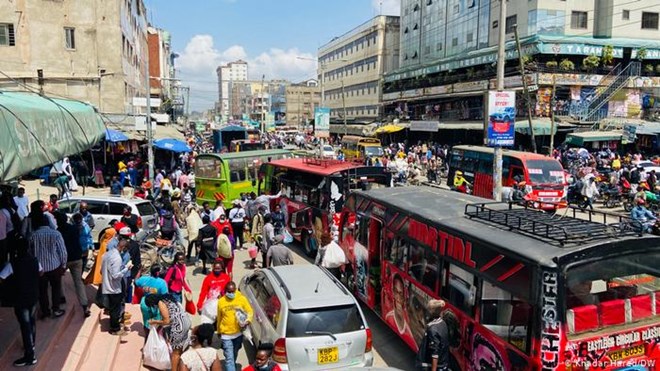
A diplomatic spat between Kenya and Somalia is now affecting trade, particularly Somalis living in Kenya. Somalia blames its neighbor for ‘meddling in its internal affairs’, a charge, Kenya denies.Ads By Many Somali-owned businesses, especially those in the travel industry, say they are already bearing the brunt after the Somali government decided to revoke visas on arrival for Kenyans.
Somalia cut diplomatic relations with neighboring Kenya on Tuesday, accusing it of meddling in politics. It also withdrew its diplomats from Kenya and gave Kenyan diplomats seven days to leave Mogadishu.
In Eastleigh, a neighborhood in the capital Nairobi popular with Somalis and Kenyans of Somali descent, there are fears that the sour relations between the two neighbors will grossly affect their businesses.
Businessman Abukar Hassan Dhakane who has worked in the transport sector for the last 16 years, said that this would have a huge impact on them as a merchant. “Unlike before, Kenyan citizens have to apply for visas at the Somali embassy in Nairobi, which leaves a huge burden on our business,” Hassan Dhakane told DW.
Before the fallout, Dhakane dispatched four cargo planes of merchandise to Somalia daily. He is worried about how his business will continue to survive as the diplomatic tension resulted in his business’s sharp decline.
“Before the diplomatic rift, we used to send each day four cargo flights to Mogadishu, but the flights are now limited to one only. We hope this will end well.”
Is Somalia ungrateful to Kenya?
Juliet Njau, a Kenyan national, told DW that Somalia is ungrateful for the support her country has provided to Somali refugees and its efforts to bring peace to Somalia.
“Kenya has hosted a huge number of refugees from Somalia, mainly in Garissa county, northeastern Kenya, and Kakuma refugee camp. Kenya has lost a lot of soldiers fighting al-Shabab Islamists.”
However, Njau also added that “Kenya should respect Somalia’s sovereignty and stop political meddling. We are brothers and sisters, we are neighbors, so it is good that we maintain the security of this nation,” Njau added.
The Horn of Africa has not known peace since the fall of dictator Siad Barre in 1991.
Somalia free to chart its own destiny
Barre Ali, a Somali living in Nairobi, told DW that Somalia, being an independent country, is free to make its own decisions.
“It is the Kenyan leaders who were supposed to show patience and play a conciliatory role and help address the grievances expressed by the Somali government,” Ali said.
“In case they failed to act accordingly, then the Somali government as a sovereign nation has every right to take such a decision, and this will result in new negotiations between the two countries.”
Ali said even if the current leadership is replaced and a new government takes over, the Somali people’s will for governance, the rule of law, and respect for their nation’s sovereignty will remain.
Seeking reconciliation
Observers think that leaders from both countries need to de-escalate the current tensions. They advise that both Somalian and Kenyan leaders sit together and iron out their differences.
Professor Abdiwahab Abdisamad, a Kenyan academic, says, “the diplomatic rift between Kenya and Somalia requires both countries to revive previous bilateral agreements.”
It should be recalled that Kenya’s government, which did not comment Tuesday directly on the latest rebuke, had in early 2019 recalled its ambassador after Mogadishu decided to auction oil and gas blocks. Those severed ties were restored in November last year.
On Tuesday, Kenyan foreign ministry spokesman Cyrus Oguna noted that Kenya had been “very kind” in accommodating some 200,000 Somalis at refugee camps. “We have a lot of commonality between these two countries,” said Oguna.
Five killed in suicide bomb blast at Galkayo Stadium

Five killed in suicide bomb blast at Galkayo Stadium




Source: Hiiraan Online, Friday December 18, 2020
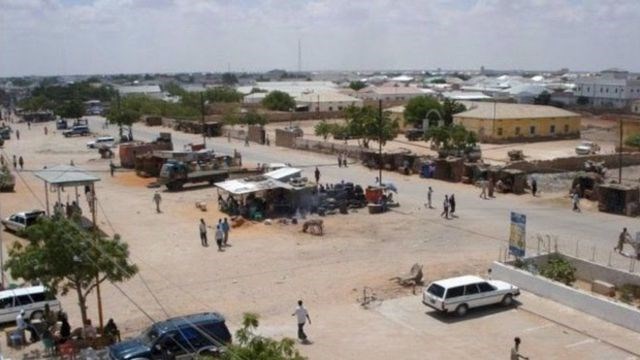
GALKAYO (HOL) – At least five people including senior military officials were killed and several others sustained injuries on Friday evening after suspected suicide bomber blew himself up at a stadium in Galkayo in central Somalia.
The attacker has reportedly targeted security forces at the entrance of the stadium where a welcoming rally for prime minister, Mohamed Hussein Roble was ongoing.
2Among the victims killed in the blast are the commander of Danab forces in Galmudug state, Mukhtar and the former mayor of Galkayo, Mohamud Yasin Ahmed.
Sources confirmed that the prime minister was not at the stadium when explosion occurred.
Al-shabaab group has claimed the responsibility for the attack.
Ethiopia’s Future Hinges on a Leader Who’s Brought Peace — and Conflict
Ethiopia’s Future Hinges on a Leader Who’s Brought Peace — and Conflict




Source: Bloomberg, Friday December 18, 2020
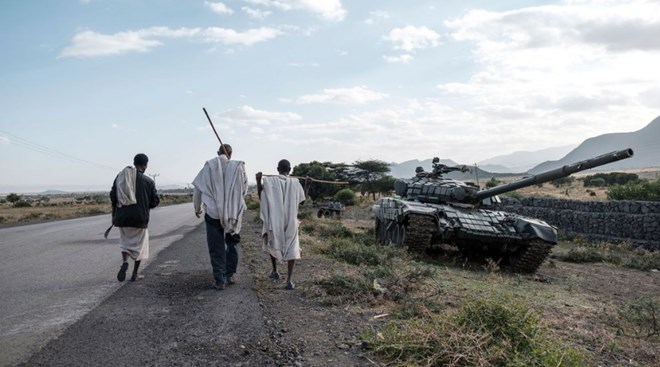
An abandoned tank belonging to Tigrayan forces, south of the town of Mehoni, Ethiopia, on Dec. 11.
Addressing federal troops last weekend in the captured capital of Ethiopia’s Tigray province, Prime Minister Abiy Ahmed declared victory and asked locals to turn in their fugitive leaders so he could focus on “development.” Not everyone’s convinced the bloodshed’s over.
What comes next for Africa’s second-most populous nation will depend largely on who Ethiopia’s leader really is: a reformer who won a Nobel Peace Prize for ending the conflict with neighboring Eritrea, or another strongman-in-the-making.
More than two-and-a-half years after the ex-army intelligence officer rode a wave of pro-democracy protests to power, Abiy’s ambitions to raise Ethiopia’s regional profile and strengthen its economy with his push for national “synergy” have rubbed up against the conflicting interests of its 80 ethnic groups and multiple religions.
By reining in regional disputes and opening borders, he could underpin Ethiopia’s fast-growing, if fragile, economy, which expanded by just over 10% per year from 2005 to 2019. That may have a stabilizing effect across a turbulent neighborhood that includes Somalia and Sudan.
A descent into chaos could, equally, fuel further instability in the Horn of Africa.
“Maintain your unity and the unity of the people,” Abiy told troops assembled in Mekelle Sunday, commending them for fighting together despite ethnic differences.

